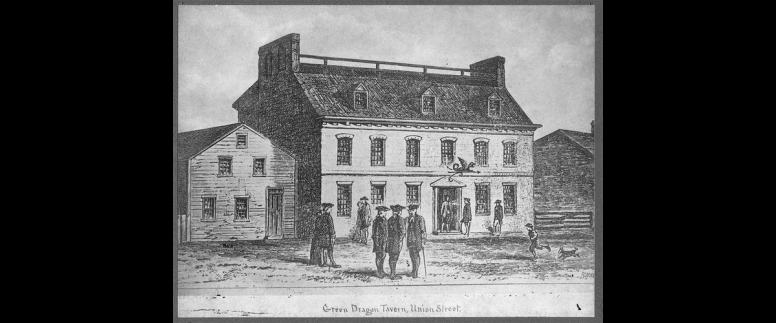
I've previously written about some of the oldest bars in America. Many of those bars, taverns, and pubs go to great lengths to highlight their ties to the founding fathers. Why don't we look into those ties, and see how bars and taverns were even then a vital part of our emerging nation.
Taverns and similar places were the natural gathering place in colonial society. They were a place where farmers could interact with tradesmen, where newspapers and pamphlets were displayed, and where patrons could debate the issues of the day. And I'm sure they never had to resort to fisticuffs to settle debate. No, no, not these upstanding gentlemen.
When we think about the beginnings of the Revolutionary War, the events that may come to mind include the Boston Massacre, the Boston Tea Party, and Paul Revere's ride. So it seems natural enough to begin with Boston's Green Dragon Tavern, a place where the Sons of Liberty met to plan their covert activities. In 1764, the already well-established Green Dragon was purchased by a mason's lodge that included noted patriots Dr. Joseph Warren and Paul Revere.
As trouble began to brew in Boston around 1774, Revere organized a group of men (he said they were mostly "mechanics") to observe and note the movements of British soldiers. This group first met at the Green Dragon Tavern, but the tavern was so well known as a base for patriot operations that they eventually had move to a different location.
There all manner of stories passed down concerning different founding fathers meeting in pubs and taverns up and down the east coast. In the oldest bars article, I mentioned the City Tavern in Philadelphia. In addition to being the hometown of Benjamin Franklin, Philadelphia was also the meeting place of the Continental Congress that signed the Declaration of Independence and the convention that met to draft the Constitution. Representatives to both of those bodies often met at the City Tavern, and they even celebrated signing the Constitution there.
Let's return to Benjamin Franklin, someone with quite an appetite for life in general and an appreciation for drinks as well. He wrote that wine was, " a constant proof that God loves us, and loves to see us happy." He was also a man who once compiled a highly entertaining list of 220 terms used to call someone a drunk. I think my favorite is, "He’s had a Thump over the Head with Sampson’s Jawbone", though "He’s Disguiz’d" has a certain simplicity. Franklin was also purported to have been an early fan of the City Tavern.
Virginia was another prominent source of discontent in the years leading up to the Revolutionary War, and many of the founding fathers hail from there. The Raleigh Tavern was often a center of patriot activity in Virginia. Around 1770, Britain's governor of Virginia broke up the House of Burgesses and tried to remove any representation of the people in government. The burgesses (basically the legislators, and including men like Thomas Jefferson, George Washington, and Patrick Henry) then met in the Raleigh Tavern and even passed legislation. In the years leading up to the war, Henry and Jefferson often used the tavern to meet with contacts from the other colonies.
It took a great deal of courage to stand up to the British, and I'm sure the founding fathers had plenty on their own. Still, it should come as no surprise that many of them found more courage in pints of ale, glasses of whiskey, and the encouragement of their fellows at the bar.




